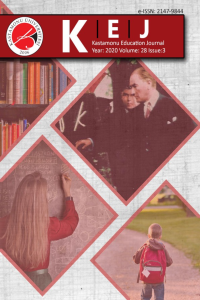Abstract
References
- Aktay, A. (2008). Yönetici ve öğretmenlerin değer tercihleri ile örgütsel vatandaşlık davranışları arasındaki ilişkinin incelenmesi [Yayımlanmamış yüksek lisans tezi]. Yeditepe Üniversitesi.
- Alptekin, B. (2019). Öğretmen adaylarının toplumsal cinsiyet rolleri ile öğretmenlik mesleğine yönelik tutumları (Pre-service teachers' attitudes towards gender roles and teaching profession) [Unpublished master’s thesis]. Bolu Abant İzzet Baysal Üniversitesi.
- Amormino, P., Ploe, M., & Marsh, A. (2022). Moral foundations, values, and reasoning in extraordinary altruists, Research Square.
- Bacanlı, H. (2002). Değer tercihleri: Psikolojik kavram analizleri. Nobel Yayın Dağıtım.
Abstract
Purpose: Teachers have crucial influence on shaping students’ values and behaviors either directly or indirectly besides implementing the curriculum. The current study examined the effects of gender, job position, seniority, marital status and educational status on principals and teachers’ value orientations.
Design/Methodology/Approach: To understand teachers’ values, we used survey research design. We conducted group comparison analyses (t-test and ANOVA) to determine whether gender, job position, seniority, marital status and educational status led to a difference in teachers' value preferences.
Findings: The values that are considered the most important by teachers were “hedonism” and the least mean score in “stimulation”. Also, the variable of gender caused a statistically significant difference in the values of “achievement”, “benevolence”, “security” and “universalism” in favor of female teachers. Single teachers have higher level of “achievement”, “benevolence”, “security”, “self-direction”, “stimulation” and “universalism” values. With regard to educational status, no meaningful difference was found towards value orientations. Also, age and seniority variables didn’t cause meaningful difference.
Highlights: It is important to reveal the values adopted by teachers and school principals to make sense of education systems. Especially today's changing structure makes it necessary to determine the values adopted in educational organizations by repeating them in different periods.
Keywords
References
- Aktay, A. (2008). Yönetici ve öğretmenlerin değer tercihleri ile örgütsel vatandaşlık davranışları arasındaki ilişkinin incelenmesi [Yayımlanmamış yüksek lisans tezi]. Yeditepe Üniversitesi.
- Alptekin, B. (2019). Öğretmen adaylarının toplumsal cinsiyet rolleri ile öğretmenlik mesleğine yönelik tutumları (Pre-service teachers' attitudes towards gender roles and teaching profession) [Unpublished master’s thesis]. Bolu Abant İzzet Baysal Üniversitesi.
- Amormino, P., Ploe, M., & Marsh, A. (2022). Moral foundations, values, and reasoning in extraordinary altruists, Research Square.
- Bacanlı, H. (2002). Değer tercihleri: Psikolojik kavram analizleri. Nobel Yayın Dağıtım.
Details
| Primary Language | English |
|---|---|
| Subjects | Studies on Education |
| Journal Section | Research Article |
| Authors | |
| Publication Date | October 28, 2022 |
| Acceptance Date | September 20, 2022 |
| Published in Issue | Year 2022 Volume: 30 Issue: 4 |


